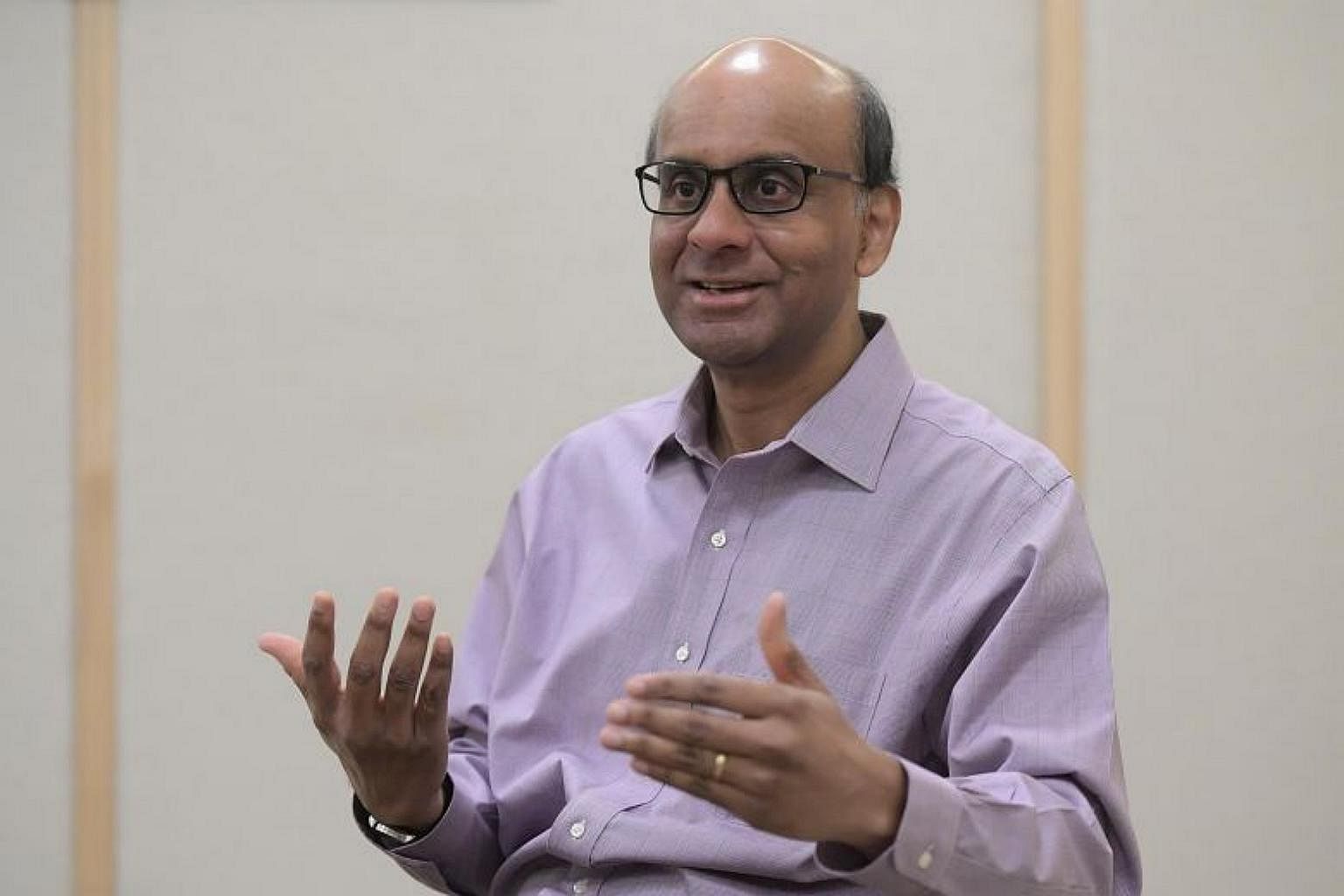G-20 panel led by Tharman calls for reset of global financial system to better tackle challenges
Sign up now: Get ST's newsletters delivered to your inbox

Mr Tharman Shanmugaratnam noted that globalisation has changed the world tremendously, giving rise to the need for a new, cooperative international order that will help nations achieve stronger, more inclusive, and more sustainable growth.
PHOTO: ST FILE
NUSA DUA (BALI) - Wide-ranging reforms are needed to reset the global financial system and make it work amid turbulent times, an international panel of top economists and leaders said on Friday (Oct 12).
The Group of 20 (G-20) Eminent Persons Group on Global Financial Governance, in a report issued at the annual meetings of the International Monetary Fund (IMF) and World Bank, underlined that the open and competitive world order of the past 70 years has lifted many out of poverty and fostered unprecedented peace.
But the system of international governance and cooperation that underpins it is fraying, and there is a real risk of drift into a fragmented world, in which all nations would end up losing, it said.
"There is no going back to the old multilateralism. There is no single conductor. There are already many more orchestras in play," said the panel. "The world needs a new harmony."
There must arise a new, cooperative international order that will help nations achieve stronger, more inclusive and more sustainable growth, it urged.
The panel's proposed reforms cover a range of areas, and include strengthening public finances and encouraging greater private investment, as well as tapping the networks of non-governmental organisations and philanthropic groups to help developing economies level up.
Globalisation has changed the world tremendously, noted Singapore Deputy Prime Minister and Coordinating Minister for Economic and Social Policies Tharman Shanmugaratnam, who chairs the eminent persons group.
"Because we've succeeded in lifting large parts of humanity out of poverty, because China has succeeded, we now have a more multi-polar world," he said at a discussion on the group's recommendations at the annual membership meeting of the Institute of International Finance, a global finance industry association, in Bali.
"And we now have to reset international governance for a multi-polar world - not because we've been failing, but because we've succeeded."
The next 10 years will pose an immense challenge, with more people poised to reach working age in the developing world than in any past decade, Mr Tharman added.
The group called for bold and urgent reforms in development policies and financing to achieve the major step-up in growth, job opportunities and sustainability that the world needs in the coming decade.
"The current pace of reforms will not get us there," it said.
And while reforms to tackle challenges such as conflict and weak infrastructure and maximise the potential of technologies and markets are needed in every country, the group stressed: "To bend the arc of history, we must succeed in Africa, where the poverty, demographic and environmental challenges are the largest - and so too the opportunities to contribute to world growth and the global commons."
This, said Mr Tharman on Friday, is a huge challenge. And the world is not prepared.
"We're not prepared in terms of job creation. We're not prepared in terms of financing. And this requires a new form of public-private partnership," he said, citing possibilities such as organising development agencies differently and diversifying risk to attract institutional investors.
"There's tremendous untapped potential, but we've got to take it. And if we fail, the consequences are not merely going to be economic consequences."
Mr Tharman also noted that, maligned as they may be, current account deficits are fine - and even necessary - for developing economies.
Singapore itself ran a deficit till the mid-80s, well above 5 per cent of GDP, he said.
"How can we make it possible for a country to run current account deficits, where it is fundamentally required, at that stage of growth to invest ahead and to create growth while savings are being built up?" he said.
"How can it be reliably financed and how can the international monetary and financial system be one where capital flows downhill once again and is invested in the right areas?"
"That's what motivates a lot of our report: Strengthening development finance and long-term finance, but also strengthening the resilience of the financial system."
The eminent persons group behind the report was set up in 2017, and consulted widely with world authorities, international financial institutions and a range of leaders, including those from civil society, academia and philanthropies.
The 16-member group comprises heavyweights with deep knowledge of finance and governance, and includes the former president of the European Central Bank Jean-Claude Trichet, British economist Nicholas Stern, former Under Secretary of the US Treasury John Taylor, JP Morgan Chase International chairman Jacob Frenkel, former governor of the Reserve Bank of India Raghuram Rajan, and former IMF deputy managing director Zhu Min.
Its executive secretary is Mr Siddharth Tiwari, the former head of IMF's strategy, policy and review department, and a visiting distinguished fellow at the Lee Kuan Yew School of Public Policy, National University of Singapore.


